|
Books Should Be Free Loyal Books Free Public Domain Audiobooks & eBook Downloads |
|
|
Books Should Be Free Loyal Books Free Public Domain Audiobooks & eBook Downloads |
|
Plays |
|---|
Book type:
Sort by:
View by:
|
By: Lucy Maud Montgomery (1874-1942) | |
|---|---|
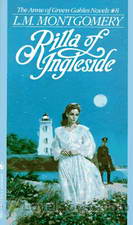 Rilla of Ingleside
Rilla of Ingleside
Rilla of Ingleside is the eighth book in the Anne of Green Gables series and focuses on the inspiring journey of Rilla Blythe, the youngest daughter of Anne and Gilbert, as she transforms from a carefree young girl into an enduring young woman swept into the chaos of war. Written from a female perspective, Montgomery accurately depicts a time in history, as she provides a contemporaneous account of the war and serves up the most emotional book in the series. Set during the First World War, the novel explores themes of coming of age, love, separation, and most importantly women’s roles during the war... | |
By: William Shakespeare (1564-1616) | |
|---|---|
 Romeo and Juliet
Romeo and Juliet
William Shakespeare’s most well-known play is more than most people realize. While it is the story of star-crossed lovers, Romeo and Juliet, it is also the story of two families in the middle of a bitter feud. Many people avoid the story because they believe it will be too difficult to read, but this is not true at all. Within a few paragraphs, the play captures your imagination and attention. Juliet is 13 years old and is love with the son of her father’s enemy. Her father has promised that she will marry another boy when it is time, but she refuses to accept the suit... | |
 King Lear
King Lear
Considered to be one of Shakespeare's greatest plays, the tragedy King Lear portrays some of the darkest aspects of human nature that can be found in literature. The helplessness of the human condition, as we fall prey to our destinies, the injustice and random cruelties practiced by people, suffering and humiliation, the lust for power and the greed for wealth are all depicted in this magnificent play. And through it all, runs the golden thread of love and sacrifice, daughterly affection and the true nature of our relationship with our parents... | |
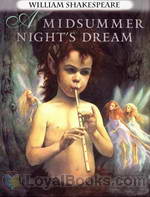 A Midsummer Night's Dream
A Midsummer Night's Dream
Summer nights, romance, music, comedy, pairs of lovers who have yet to confess their feelings to each other, comedy and more than a touch of magic are all woven into one of Shakespeare's most delightful and ethereal creations – A Midsummer Night's Dream. The plot is as light and enchanting as the settings themselves. The Duke of Athens is busy with preparations for his forthcoming wedding to Hippolyta the Amazonian Queen. In the midst of this, Egeus, an Athenian aristocrat marches in, flanked by his lovely daughter Hermia and her two suitors, Lysander and Demetrius... | |
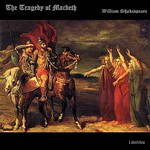 The Tragedy of Macbeth
The Tragedy of Macbeth
Right from its famous opening scene which begins, “Thunder and lightning. Enter Three Witches” The Tragedy of Macbeth by William Shakespeare holds the reader fast in a stirring, monumental experience that plumbs the depths of the human soul and reveals its most morbid secrets. The play is set in medieval Scotland. It is based partly on historical facts and recounts the tale of Macbeth, who was a king in Scotland, according to The Holinshead Chronicles, a book published in 1577. This book was extensively used by contemporary playwrights like Shakespeare and Marlowe as inspiration for their themes, characters and events... | |
 As You Like It
As You Like It
In a tiny French dukedom, a younger brother usurps his elder brother's throne. Duke Senior is banished to the Forest of Arden along with his faithful retainers, leaving his lovely daughter Rosalind behind to serve as a companion for the usurper's daughter, Celia. However, the outspoken Rosalind soon earns her uncle's wrath and is also condemned to exile. The two cousins decide to flee together and join Duke Senior in the forest. Meanwhile, a young nobleman, Orlando is thrown out of his home by his cruel older brother Oliver... | |
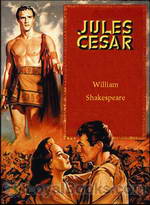 Julius Caesar
Julius Caesar
Though it's titled The Tragedy of Julius Caesar, the man himself appears only in five scenes in the entire play! However, such is his impact on the events that surrounded him that he still remains the central figure in this psychological drama that combines politics, honor, assassination, betrayal, the lust for power, patriotism and friendship. Set in 44 BC in ancient Rome, it is one of William Shakespeare's early Tragedies. First thought to have been performed in September 1599, William Shakespeare's original text or script have long vanished... | |
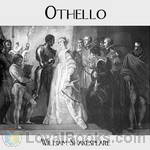 Othello
Othello
In seventeenth century Venice, a wealthy and debauched man discovers that the woman he is infatuated with is secretly married to a Moorish general in the Venetian army. He shares his grief and rage with a lowly ensign in the army who also has reason to hate the general for promoting a younger man above him. The villainous ensign now plots to destroy the noble general in a diabolical scheme of jealousy, paranoia and murder, set against the backdrop of the bloody Turkish-Venetian wars. This timeless tale, Othello The Moor of Venice was one of the ten famous tragedies that William Shakespeare wrote... | |
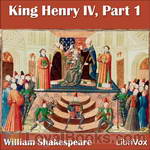 King Henry IV
King Henry IV
King Henry IV, Part 1 is the second of Shakespeare’s eight Wars of the Roses history plays, with events following those of King Richard II. As the play opens, King Henry IV (formerly Henry Bolingbroke) and Henry Percy (Hotspur) argue over the disposition of prisoners from the Battle of Holmedon. The King’s attitude toward Mortimer and the Percy family prompts them to plot rebellion. In the meantime, his son Prince Hal is living the low life in the company of Sir John Falstaff. As the time of battle nears, Prince Hal joins his father and is given a high command... | |
 The Merchant of Venice
The Merchant of Venice
William Shakespeare's The Merchant of Venice was probably written between 1596 and 1598, and was printed with the comedies in the First Folio of 1623. Bassanio, an impoverished gentleman, uses the credit of his friend, the merchant Antonio, to borrow money from a wealthy Jew, Shylock. Antonio pledges to pay Shylock a pound of flesh if he defaults on the loan, which Bassanio will use to woo a rich heiress, Portia. A subplot concerns the elopement of Shylock's daughter Jessica with a Christian, Bassanio's friend Lorenzo... | |
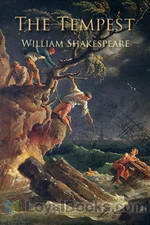 The Tempest
The Tempest
Banished from his own lands by a usurping brother, Prospero and his daughter Miranda have been living on a deserted island for years, until fate brings the brother within the range of Prospero's powers. Will he seek revenge, or reconcilement? | |
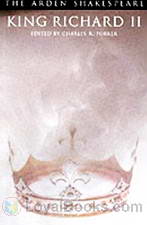 King Richard II
King Richard II
The Tragedy of King Richard II, by William Shakespeare, is the first of the history series that continues with Parts 1 and 2 of King Henry IV and with The Life of King Henry V. At the beginning of the play, Richard II banishes his cousin Henry Bolingbroke from England. Bolingbroke later returns with an army and the support of some of the nobility, and he deposes Richard. Richard is separated from his beloved Queen, imprisoned, and later murdered. By the end of the play, Bolingbroke has been crowned King Henry IV... | |
 Much Ado About Nothing
Much Ado About Nothing
Written around the middle of his career, Much Ado About Nothing is one of Shakespeare's great festive comedies. The men are back from the war, and everyone is ready for romance. The dashing young Claudio falls for Hero, the daughter of Leonato, governor of Messina, and his friend Don Pedro helps him secure her affection. These youthful lovers are contrasted with the more experienced (and more cynical) Benedick and Beatrice, who have to be tricked into falling in love. Don Pedro's bastard brother, Don John, provides the intrigue, and the dimwitted constable Dogberry provides the laughs. | |
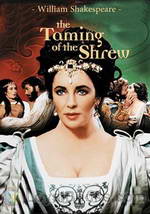 The Taming of the Shrew
The Taming of the Shrew
The Taming of the Shrew is one of Shakespeare's earliest comedies, and was inspired by classical Roman comedy and the Italian commedia dell'arte. Baptista Minola, a rich gentleman of Padua, has two daughters: Katherina, renowned for her sharp tongue, and Bianca, who is sought after by multiple suitors. Baptista decides that Bianca cannot marry until her elder sister finds a husband. Enter Petruchio, who has come to "wive it wealthily in Padua," and who is convinced by Bianca's suitors to woo Katherina. The play ultimately poses the question of who is the bigger shrew: Kate or Petruchio. The subplot involves the subterfuge employed by Lucentio to woo the lovely Bianca. | |
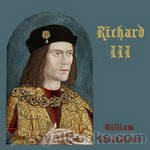 Richard III
Richard III
Richard III is an early history play probably written and performed around 1592-93. It is the culmination of Shakespeare's earlier three plays about Henry VI, and chronicles the bloody career of Richard, Duke of Gloucester. As the play opens, the Wars of the Roses are over, King Edward IV (Richard's brother) is on the throne, and all is ostensibly well. The problem? Richard wants to be king - and he'll stop at nothing to realize his ambition. | |
 All's Well That Ends Well
All's Well That Ends Well
Despite its optimistic title, Shakespeare's All's Well That Ends Well has often been considered a "problem play." Ostensibly a comedy, the play also has fairy tale elements, as it focuses on Helena, a virtuous orphan, who loves Bertram, the haughty son of her protectress, the Countess of Rousillon. When Bertram, desperate for adventure, leaves Rousillon to serve in the King's army, Helena pursues him. | |
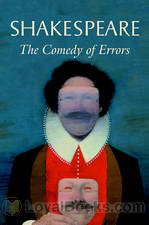 The Comedy of Errors
The Comedy of Errors
The Comedy of Errors is one of William Shakespeare's earliest plays, believed to have been written between 1592 and 1594. It is his shortest and one of his most farcical comedies, with a major part of the humour coming from slapstick and mistaken identity, in addition to puns and word play. The Comedy of Errors tells the story of two sets of identical twins that were accidentally separated at birth. Antipholus of Syracuse and his servant, Dromio of Syracuse, arrive in Ephesus, which turns out to be the home of their twin brothers, Antipholus of Ephesus and his servant, Dromio of Ephesus... | |
 Henry V
Henry V
After the turmoil and uncertainty of Henry IV a new era appears to dawn for England with the accession of the eponymous Henry V. In this sunny pageant, the Chorus guides us along Henry's glittering carpet ride of success as the new king completes his transformation from rebellious wastrel to a truly regal potentate. Of course, there is an underlying feeling that the good times won't last, and this is all the more reason to enjoy the Indian summer before the protracted and bitter fall of the house of Lancaster. | |
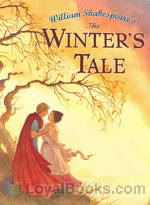 The Winter's Tale
The Winter's Tale
Mad with jealousy, King Leontes of Sicilia orders his best friend Polixenes killed, his child abandoned, and his wife put on trial for adultery. Sixteen years later, Perdita, raised as a shepherd's daughter, falls in love with Polixenes's royal son and returns to her father's kingdom. | |
 Measure For Measure
Measure For Measure
Generally considered one of Shakespeare's problem plays, Measure for Measure examines the ideas of sin and justice. Duke Vincentio turns Vienna's rule over to the corrupt Angelo, who sentences Claudio to death for having impregnated a woman before marriage. His sister Isabella, a novice nun, pleads for her brother's life, only to be told that he will be spared if she agrees to relinquish her virginity to Angelo. | |
 Love's Labour's Lost
Love's Labour's Lost
Love's Labour's Lost is an early comedy by William Shakespeare. Ferdinand, the King of Navarre, and his three friends take a vow of study and seclusion for three years, during which they are forbidden to see or speak to women. Their vows are immediately tested by the arrival of the Pricess of France and her three ladies to the King's court. | |
 Titus Andronicus
Titus Andronicus
Titus Andronicus may be Shakespeare's earliest tragedy; it is believed to have been written in the early 1590s. It depicts a Roman general who is engaged in a cycle of revenge with his enemy Tamora, the Queen of the Goths. The play is by far Shakespeare's bloodiest work. It lost popularity during the Victorian era because of its gore, and it has only recently seen its fortunes revive. | |
 Antony and Cleopatra
Antony and Cleopatra
Antony and Cleopatra is a tragedy by William Shakespeare, believed to have been written sometime between 1603 and 1607. It was first printed in the First Folio of 1623. The plot is based on Thomas North's translation of Plutarch's Life of Marcus Antonius and follows the relationship between Cleopatra and Mark Antony from the time of the Parthian War to Cleopatra's suicide. The major antagonist is Octavius Caesar, one of Antony's fellow triumviri and the future first emperor of Rome. The tragedy is a Roman play characterized by swift, panoramic shifts in geographical locations and in registers, alternating between sensual, imaginative Alexandria and the more pragmatic, austere Rome. | |
 Henry VI
Henry VI
Henry VI, Part 1 is a history play by William Shakespeare, believed to have been written in 1591, and set during the lifetime of King Henry VI of England. Whereas 2 Henry VI deals with the King's inability to quell the bickering of his nobles, and the inevitability of armed conflict, and 3 Henry VI deals with the horrors of that conflict, 1 Henry VI deals with the loss of England's French territories and the political machinations leading up to the Wars of the Roses, as the English political system is torn apart by personal squabbles and petty jealousy. | |
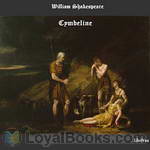 Cymbeline
Cymbeline
Cymbeline is one of Shakespeare's late romances, which (like The Tempest and The Winter's Tale) combines comedy and tragedy. Imogen, the daughter of King Cymbeline of Britain, angers her father when she marries Posthumus, a worthy but penniless gentleman. The King banishes Posthumus, who goes to Rome, where he falls prey to the machinations of Iachimo, who tries to convince him that Imogen will be unfaithful. Meanwhile, the Queen (Imogen's stepmother) plots against her stepdaughter by trying to plan a match between Imogen and her worthless son Cloten. | |
 The Two Gentlemen of Verona
The Two Gentlemen of Verona
The Two Gentlemen of Verona is the earliest comedy written by Shakespeare (and possibly his first play), probably written around 1590-91. It focuses on two friends, Valentine and Proteus, whose friendship is disrupted by their mutual passion for the lovely Silvia. Proteus jilts Julia in order to pursue Silvia; she responds by enlisting the help of her maid Lucetta to dress as a boy and go after Proteus. The play also includes some wonderfully comic supporting characters, particularly Launce and his scene-stealing dog Crab. | |
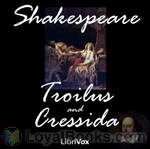 Troilus and Cressida
Troilus and Cressida
Troilus and Cressida is Shakespeare's "problem" play about the Trojan War. As the opening Chorus tells us, the play "begins in the middle" of the epic conflict, and counterpoints the drama of battle with the romance of the title characters. Just as Agamemnon and his Greek forces (particularly the smooth-tongued Ulysses) attempt to woo the invincible Achilles to resume fighting on their side, the Trojan go-between Pandarus tries to bring together Troilus, a son of King Priam, with his niece, the lovely Cressida. | |
 Henry VIII
Henry VIII
This is Shakespeare's dutiful tribute to one of the most imposing and terrifying rulers in European history. The kingdom trembles as the giant monarch storms through his midlife crisis, disposing of the faithful Katharine of Aragon and starting a new life and, the king hopes, a line of succession with the captivating young Anne Bullen. Unlike his predecessors, Henry has no doubt about the security of his tenure on the throne, and dominates the royal court with absolute authority. The extent of the King's power is graphically illustrated by the fate of the Duke of Buckingham, who goes calmly to execution while deploring, not the unjust despotism of the king... | |
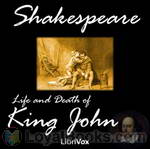 King John
King John
The Life and Death of King John, a history play by William Shakespeare, dramatises the reign of John, King of England (ruled 1199–1216), son of Henry II of England and Eleanor of Aquitaine and father of Henry III of England. It is believed to have been written in the mid-1590s but was not published until it appeared in the First Folio in 1623. John (24 December 1166 – 19 October 1216), also known as John Lackland or Softsword, was King of England from 6 April 1199 until his death. His reign... | |
 The Merry Wives of Windsor
The Merry Wives of Windsor
The Merry Wives of Windsor is a comedy by William Shakespeare, first published in 1602, though believed to have been written prior to 1597. It features the fat knight Sir John Falstaff, and is Shakespeare's only play to deal exclusively with contemporary Elizabethan era English middle class life. | |
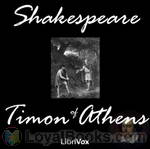 Timon of Athens
Timon of Athens
The Life of Timon of Athens is a play by William Shakespeare about the fortunes of an Athenian named Timon (and probably influenced by the philosopher of the same name, as well), generally regarded as one of his most obscure and difficult works. Originally grouped with the tragedies, it is generally considered such, but some scholars group it with the problem plays. The play has caused considerable debate among scholars. It is oddly constructed, with several lacunae (gaps) and for this reason is often described as unfinished, multi-authored, and/or experimental... | |
 King Richard III
King Richard III
| |
 Shakespeare's First Folio
Shakespeare's First Folio
| |
 The New Hudson Shakespeare: Julius Cæsar
The New Hudson Shakespeare: Julius Cæsar
| |
 King Henry V
King Henry V
| |
 Richard II
Richard II
| |
 The Works of William Shakespeare [Cambridge Edition]
The Works of William Shakespeare [Cambridge Edition]
| |
 Measure for Measure
Measure for Measure
| |
 Pericles
Pericles
| |
 King Henry the Fifth Arranged for Representation at the Princess's Theatre
King Henry the Fifth Arranged for Representation at the Princess's Theatre
| |
 Measure for Measure
Measure for Measure
| |
 King Henry V
King Henry V
| |
 Measure for Measure
Measure for Measure
| |
 King Henry V
King Henry V
| |
 The Life of Timon of Athens
The Life of Timon of Athens
| |
 History of Troilus and Cressida
History of Troilus and Cressida
| |
 King Henry VIII
King Henry VIII
| |
 King Henry VIII
King Henry VIII
| |
 King Henry VIII
King Henry VIII
| |
By: Thomas Hardy (1840-1928) | |
|---|---|
 The Dynasts
The Dynasts
| |
By: Jack London (1876-1916) | |
|---|---|
 The Acorn-Planter A California Forest Play (1916)
The Acorn-Planter A California Forest Play (1916)
| |
By: Oscar Wilde (1854-1900) | |
|---|---|
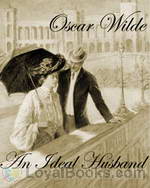 An Ideal Husband
An Ideal Husband
This story opens at a fashionable dinner party in Sir Robert Chiltern's home in the heart of London's stylish Grosvenor Square. One of Lady Chiltern's old school-friends, Mrs. Cheveley, a woman with a dubious past, accosts Sir Robert and threatens to expose a financial crime that he had once participated in, unless he agrees to finance a fraudulent construction project that she's promoting. Lady Chiltern is astounded when her husband who had been the severest critic of this project suddenly begins to speak in its favor... | |
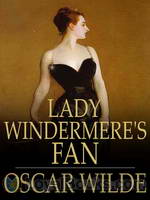 Lady Windermere's Fan
Lady Windermere's Fan
Lady Windermere’s Fan: A Play About a Good Woman is a four act comedy by Oscar Wilde, published in 1893. As in some of his other comedies, Wilde satirizes the morals of Victorian society, and attitudes between the sexes. The action centres around a fan given to Lady Windermere as a present by her husband, and the ball held that evening to celebrate her 21st birthday. | |
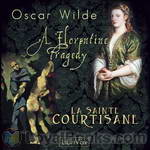 A Florentine Tragedy and La Sainte Courtisane
A Florentine Tragedy and La Sainte Courtisane
Two short fragments: an unfinished and a lost play. A Florentine Tragedy, left in a taxi (not a handbag), is Wilde’s most successful attempt at tragedy – intense and domestic, with surprising depth of characterisation. It was adapted into an opera by the Austrian composer Alexander Zemlinsky in 1917. La Sainte Courtisane, or The Woman Covered in Jewels explores one of Wilde’s great idées fixes: the paradox of religious hedonism, pagan piety. Both plays, Wildean to their core, revel in the profound sadness that is the fruit of the conflict between fidelity and forbidden love... | |
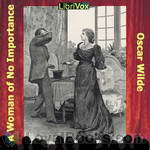 A Woman of No Importance
A Woman of No Importance
A Woman of No Importance is a play by Irish playwright Oscar Wilde. The play premièred on 19 April 1893 at London's Haymarket Theatre. It is a testimony of Wilde's wit and his brand of dark comedy. It looks in particular at English upper class society and has been reproduced on stages in Europe and North America since his death in 1900. | |
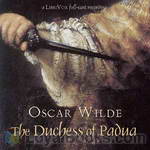 The Duchess of Padua
The Duchess of Padua
Guido Ferranti, a young man, travels to Padua with his friend Ascanio after receiving a mysterious letter from a stranger, claiming to know the true secret of Guido's birth. His plan of revenge goes awry, however, when he falls in love with his enemy's beautiful wife, the Duchess of Padua. | |
 Intentions
Intentions
| |
 Vera; or the Nihilists
Vera; or the Nihilists
Vera; or, The Nihilists is a play by Oscar Wilde. It is a melodramatic tragedy set in Russia and is loosely based on the story of Vera Zasulich. It was the first play that Wilde wrote. It was produced in the United Kingdom in 1880, and in New York in 1882, but it was not a success and folded in both cities. It is nowadays rarely revived. | |
 For Love of the King a Burmese Masque
For Love of the King a Burmese Masque
| |
By: George MacDonald | |
|---|---|
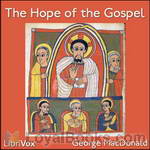 The Hope of the Gospel
The Hope of the Gospel
Perhaps most well-known for his fairytales and fantasy stories such as The Golden Key and Phantastes, or for his poetry, George MacDonald was a great spiritual master of the nineteenth century. He spent several years as a minister in his native Scotland; however he was forced to resign his position due to ill health. He had a profound influence on such later writers as G. K. Chesterton and C. S. Lewis – the latter of whom considered MacDonald to be his spiritual father, and edited an anthology of his works... | |
 The Gifts of the Child Christ
The Gifts of the Child Christ
It's the Advent season in London but all is not well in the Greatorex household. All this will change with a surprise on Christmas morning. (Ann Boulais) | |
By: Joseph Conrad (1857-1924) | |
|---|---|
 One Day More
One Day More
A one-act play. Eccentric Captain Hagberd has been waiting for years for his son to come home from the sea. He has scrimped and saved, outfitting a house for Harry to inherit upon his return, which will be in only "one day more." He has also planned that Harry will marry Bessie, the repressed maiden next door. Note: The recording was done outside, so there will be some ambient noise (airplanes, lawn mowers, birds, children... etc). | |
By: Mary Wollstonecraft Shelley (1797-1851) | |
|---|---|
 Proserpine and Midas
Proserpine and Midas
| |
By: Henry James (1843-1916) | |
|---|---|
 Nona Vincent
Nona Vincent
| |
By: Jerome K. Jerome | |
|---|---|
 Stage Land
Stage Land
A comic look at the curious habits and customs of the inhabitants of ‘Stage Land’. Dedicated to ‘that highly respectable but unnecessarily retiring individual, of whom we hear so much but see so little, “the earnest student of drama” | |
By: John Milton (1608-1674) | |
|---|---|
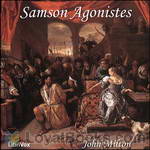 Samson Agonistes
Samson Agonistes
“The Sun to me is darkAnd silent as the Moon,When she deserts the nightHid in her vacant interlunar cave.”Milton composes his last extended work as a tragedy according to the classical Unities of Time, Place and Action. Nevertheless it “never was intended for the stage” and is here declaimed by a single reader.Samson the blinded captive, in company with the Chorus of friends and countrymen, receives his visitors on their varying missions and through them his violent story is vividly recalled... | |
By: J. M. Barrie (1860-1937) | |
|---|---|
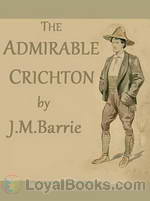 The Admirable Crichton
The Admirable Crichton
From the author of Peter Pan:Lord Loam, a British peer, considers class divisions to be artificial. He promotes his views during tea-parties where servants mingle with his aristocratic guests, to the embarrassment of all. Crichton, his butler, particularly disapproves of this.Loam, his family, a maid, and Crichton are shipwrecked on a deserted tropical island. The resourceful Crichton is the only one of the party with any practical knowledge. Eventually, social roles are reversed, and Crichton becomes the governor. | |
By: Charles Lamb | |
|---|---|
 Mr. H
Mr. H
Mr H is a farce that was first performed at Drury Lane in 1806. The plot is slender and revolves around a single rather feeble joke, but the characters are skilfully drawn and the sharp observations of contemporary fashion do much to divert the listener from the weakness of the central theme. More a comedy of manners rather than a true farce, this short play is best enjoyed as a gentle romp through the eccentricities of the Regency period. | |
By: Johann Wolfgang von Goethe (1749-1832) | |
|---|---|
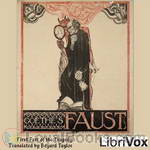 Faust, Part 1
Faust, Part 1
Faust is the protagonist of a classic German legend; a highly successful scholar, but also dissatisfied with his life, and so makes a deal with the devil, exchanging his soul for unlimited knowledge and worldly pleasures.Johann Wolfgang von Goethe's Faust is a tragic play in two parts. It is Goethe's most famous work and considered by many to be one of the greatest works of German literature.This first part of Faust is not divided into acts, but is structured as a sequence of scenes in a variety of settings. After a dedicatory poem and a prelude in the theatre, the actual plot begins with a prologue in Heaven and Scene 1 in Faust's study. | |
 Faust — Part 1
Faust — Part 1
| |
 Faust; a Tragedy, Translated from the German of Goethe
Faust; a Tragedy, Translated from the German of Goethe
| |
 Egmont
Egmont
| |
By: Zane Grey (1872-1939) | |
|---|---|
 The Young Pitcher
The Young Pitcher
| |
By: John Galsworthy (1867-1933) | |
|---|---|
 Four Short Plays
Four Short Plays
| |
 The First and the Last
The First and the Last
| |
 Complete Plays of John Galsworthy
Complete Plays of John Galsworthy
| |
 The Little Man
The Little Man
| |
 The Eldest Son
The Eldest Son
| |
 The Fugitive
The Fugitive
| |
 Strife
Strife
| |
 A Bit O' Love
A Bit O' Love
| |
 Loyalties
Loyalties
| |
 Skin Game
Skin Game
A small play in three acts. A kind of comic tragedy. The plot tells the story of the interaction between two very different families in rural England just after the end of the First World War. Squire Hillcrist lives in the manor house where his family has lived for generations. He has a daughter, Jill, who is in her late teens; and a wife, Amy, as well as servants and retainers. He is "old money", although his finances are at a bit of low ebb. The other family is the "nouveau riche" Hornblowers,... | |
 Joy
Joy
| |
 The Foundations
The Foundations
| |
 The Pigeon
The Pigeon
| |
 The Little Dream
The Little Dream
| |
 The Mob
The Mob
| |
By: Honoré de Balzac (1799-1850) | |
|---|---|
 Pamela Giraud
Pamela Giraud
| |
By: Edna St. Vincent Millay (1892-1950) | |
|---|---|
 Aria da Capo
Aria da Capo
| |
 The Lamp and the Bell
The Lamp and the Bell
| |
By: Sir Arthur Conan Doyle (1859-1930) | |
|---|---|
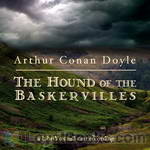 The Hound of the Baskervilles (dramatic reading)
The Hound of the Baskervilles (dramatic reading)
The Hound of the Baskervilles is the third of four crime novels by Sir Arthur Conan Doyle featuring the detective Sherlock Holmes. Originally serialised in The Strand Magazine from August 1901 to April 1902, it is set largely on Dartmoor in Devon in England's West Country and tells the story of an attempted murder inspired by the legend of a fearsome, diabolical hound. | |
By: Rabindranath Tagore (1861-1941) | |
|---|---|
 The Post Office
The Post Office
| |